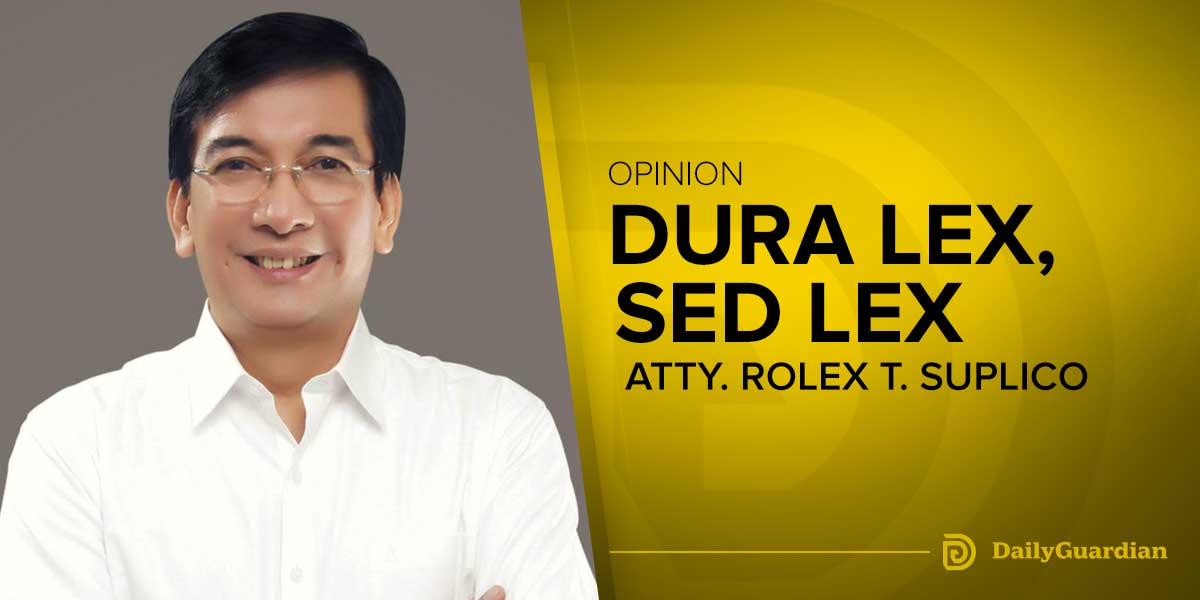
 By Atty. Rolex T. Suplico
By Atty. Rolex T. Suplico
This case – NEMESIO ARTURO S. YABUT and RICARDO M. TAMARGO, petitioners, vs. OFFICE OF THE OMBUDSMAN and DR. PAUL DORAN, respondents. – involved a traffic altercation between the then incumbent Vice-Mayor of Makati and an American ex-pat.
The incident was front-page material for media outlets at that time. It was resolved by the Supreme Court en banc in G. R. No. 111304 on June 17, 1994. Justice Jose Vitug wrote the resolution.
The confrontation occurred on Feb. 16, 1993 at around 2pm at the busy intersection of Sen. Gil Puyat and Makati Avenues. This intersection has always been a heavy traffic area, as it was in 1993.
Vice-Mayor Yabut was directing traffic therein as he was also concurrently the head of the Traffic Management Division of Makati Ctiy at that time.
Meanwhile, Dr. Paul Doran was onboard his car along Makati Avenue. He was waiting for the signal to turn left to Gil Puyat Avenue to go to EDSA and then to Pasay City. However, because of the unusually heavy traffic due to the re-routing of the vehicles from the EDSA-Pioneer-Boni area, priority was given to vehicles coming from Mandaluyong. The left turn signal on his lane was intentionally delayed.
Then, the sad episode happened:
“When the “go” signal was finally given, Doran stopped where Yabut was and asked “why (it took) so long to make a left turn?” Petitioner Yabut answered “Sorry, sir, its traffic.” This did not satisfy Doran who exclaimed, “who the hell are you,” and stuck a dirty finger sign at Yabut. Angry words soon turned into an exchange of punches between the two. Ultimately, Yabut’s traffic officers joined the fray. They pulled out Doran from his car and started beating him until three men rescued Doran and brought him to the nearby Pacific Star Building. Both Yabut and Doran suffered injuries as a result of the scuffle.”
On Feb. 22, 1993, Doran filed a complaint against Yabut before the National Bureau of Investigation. Yabut and his group filed their counter-affidavits.
Thereafter, the NBI indorsed the case to the Ombudsman, “which promptly imposed a ninety-day preventive suspension on Yabut.” During the preliminary conference, the parties, after their affidavits and counter-affidavits were submitted, agreed to submit the case for resolution. Yabut moved for the lifting of his suspension, which was granted. His suspension was lifted the following day.
Subsequently, the parties submitted their respective memoranda, with Doran opting not to submit any. The investigating officer of the Ombudsman then issued her questioned resolution, thus:
“WHEREFORE, premises considered, and pursuant to Section 25 of R.A. No. 6770 and Section 10 of Administrative Order No. 07 of this Office, it is respectfully recommended that respondents Yabut and Tamargo (a traffic officer) be meted with the penalty of suspension from office without pay for a period of two (2) months effective upon receipt of a copy of this resolution.”
After his Motion for Clarification/Reconsideration was denied, Yabut filed his Petition for Review with the Supreme Court. He argued that “the Ombudsman (1) misappreciated the evidence; (2) erred in not crediting petitioner’s period of preventive suspension; and (3) erred in imposing the penalty of two-month suspension from office, without pay, for not being commensurate with the bare finding of simple misconduct.”
The Supreme Court laid the rule that “(f)actual findings of the Ombudsman, unless clearly unsubstantiated, are conclusive; in fine, it is only when there is grave abuse of discretion by the Ombudsman that a review of factual findings can aptly be made.”
Then, the Court held that “we find neither an error of law nor grave abuse of discretion on the part of the Ombudsman.” It then dismissed Yabut’s petition.
Yabut had further argued in his petition that “his preventive suspension of 82 days should be credited to the penalty of 2-month suspension imposed on him.”
The Court denied this, stating that a “preventive suspension decreed by the Ombudsman by virtue of his authority under Section 21 of Republic Act No. 6770, in relation to Section 9 of Administrative Order No. 07, is not meant to be a penalty but a means taken to insure the proper and impartial conduct of an investigation. We have ruled, in a number of times before, that a preventive suspension may be ordered even before the charges are heard, as well as before the official concerned is given an opportunity to prove his innocence, being merely a measure that is precisely designed in order not to hamper the normal course of an investigation through the use of influence and authority.”
Then, the Court had this parting shot, quoting from the brief of the Solicitor-General:
“A public official, more especially an elected one, should not be onion skinned. Strict personal discipline is expected of an occupant of a public office because a public official is a property of the public. He is looked upon to set the example how public officials should correctly conduct themselves even in the face of extreme provocation. Always he is expected to act and serve with the highest degree of responsibility, integrity, loyalty and efficiency and shall remain accountable for his conduct to the people.”